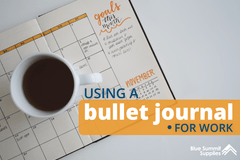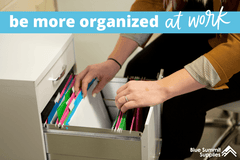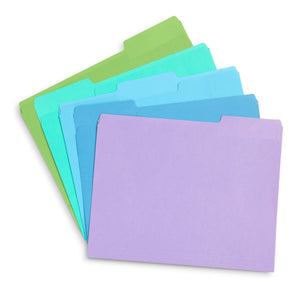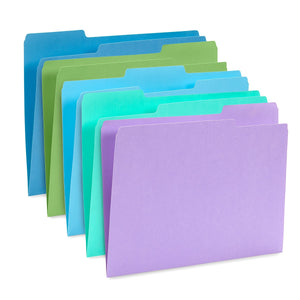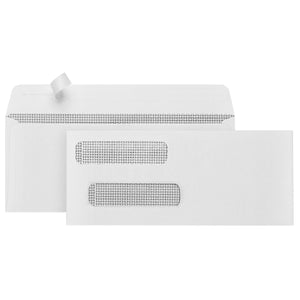Becoming more organized and having systems in place will help in both your work and personal life. For one thing, you will be more efficient, which will help you accomplish more in a day, which will then give you more time for leisure and balance. Investing the time to become more organized will help you remember what work needs to be done, prioritize what’s most important, keep up with deadlines, and show up on time.
In this post, we'll cover how to organize your day at work as well as your life at home with 10 actionable strategies.
How to be More Organized at Work

1. Keep an Everyday Planner
Keeping a routine planner will help you intentionally organize your workdays. You can purchase pre-designed planners yearly or design your own Bullet Journal system. An online system can also do the trick, so long as you are able to access it wherever you go and remember to use it on a daily basis.
Utilize a planner to schedule meetings, life events, occasions, holidays, and appointments. The only way you can ensure you don’t double book is by utilizing a calendar system. That means actually using it, continually adding events as they are booked.
Additionally, a planner will help you keep track of important tasks and allow you to plan your day in advance.

2. Plan Your Day in Advance
The best thing you can do to organize your workday is to plan and prepare in advance. Set yourself up for success by planning your day ahead of time and getting everything you’ll need ready.
Stop rushing into your day stressed, unprepared, and without a clue how the day will go. Near the end of each workday, review your calendar or planner to see what you have on the go for the following workday. Is there anything you need to remember or prepare for? What can you get ready now that will set you up for success tomorrow?
What are the most important action items for the following day? What task will you tackle first? Do you have any meetings you need to prepare for? Is there anything else important you need to remember, such as an office birthday, lunch date, or appointment? Do you need to dress in a certain way because of an important meeting or unruly weather predictions?
Set your day on the path to success before it even begins.

3. Be Realistic About Your Time
Say goodbye to that never-ending to-do list! As you plan your day or week, be realistic about your time. There are only so many hours in a day, and there’s only so much you can actually accomplish in 24 hours. No matter how hard you try, you can't create more time
Setting unachievable to-do lists only adds to your stress and makes it more difficult to focus on the tasks that matter most. Learn how to properly estimate how long it will take to complete a task and only schedule what you can accomplish in one day. Set priorities, making sure you tackle the most important tasks first.

4. Group Alike Tasks
Become more organized and more productive by grouping similar tasks. Different tasks require different abilities and levels of focus. When you group them together, you waste less time getting your brain to switch from one type of task to the next.
For example, block specific time in your day for correspondence, including emails, calls, and meetings. Block off a different chunk of time for work that requires deep concentration, such as writing or editing. Just one interruption can throw off your focus, so it’s crucial to your productivity that you don’t continually check your inbox and take calls while trying to complete tasks that require your concentration.
Organizing your workdays in advance will help you block your time efficiently based on the type of work you hope to accomplish.

5. Organize Your Space
An organized space helps you find what you need faster, and it can actually free your mind to focus on important tasks. When we work in clutter, our brains feel that clutter too. It’s harder to concentrate and more difficult to find deep focus
Take the time to organize and declutter your workspace, both at work and at home. Remove all distractions except for a few key motivators, such as photos of your family, an inspirational quote, or a visualization of your goals.

Color coding is a visual strategy that maximizes clarity. And it’s fun! Learn how to establish your own color coded system to improve your organization and the look of your workspace.

6. Organize Your Email
Email is a huge aspect of most people’s workday, yet many of us never take the time to create organizational email systems. A disorganized inbox is stressful, confusing, and it wastes time you could be spending on something more valuable, such as your own work-life balance.
Take the time to make your email work for you. Utilize folders, labels, categories, stars, color coding, and reminders to simplify and streamline the way you manage your emails. Consider organizing your inbox based on clients, projects, types of tasks, or priority. How you choose to organize your email doesn’t matter as much as ensuring you have an effective system in place.
✉️ We covered best practices for How to Organize Your Work Email for both Gmail and Outlook inboxes.

Pro tip: Schedule specific time in the day to check your email rather than leaving it open all the time. Every incoming email is a distraction that will derail your focus. Instead, save checking your email for a few scheduled times throughout the day.

7. Utilize Digital Organizational Tools
Today, there are all sorts of online tools that can help you establish organizational systems. You can use these tools to track tasks, manage projects, assign work, set due dates, and group alike tasks.
We don’t recommend using all of them at once, but Trello, Asana, or Notion are good places to start. You can sign up for a free basic plan and use your tool of your choice as an individual if your workplace doesn’t already provide something similar.
We covered these tools and other time management strategies in our article: The Importance of Time Management and How to Optimize Your Time.
Tips for Organizing Your Life Outside of Work

8. Organize Your Home Space
A disorganized life is going to seep into your work life. As you become more organized at work, don’t forget about your organization at home.
The spaces you live and work in are important, and the more clutter you have in your life, the more difficult it will be to stay organized. Messy environments make it difficult to concentrate; you spend more time looking for missing things, and you’re more likely to forget something.
Organize and declutter any space in your home you work out of, but don’t stop there. Continue with the other areas of your house so that when you relax at home, you can do so without the weight and burden of a disorganized space.

9. Build a Custom Morning Routine
Establishing a custom morning routine will help you maintain work-life balance, and it will set your day up for success. What you choose to do in the morning will dictate how the rest of your day works out.
Build healthy habits into your morning, such as spending time with your family, meditation, exercise, eating a healthy breakfast, journaling, or reading. Avoid bad habits, such as hitting the snooze button, checking your phone as soon as you wake up, scrolling on social media, eating processed foods, and rushing out the door at the last minute.

10. Build a Custom Bedtime Routine
Bedtime routines are just as important for setting up your day successfully. Sleep is incredibly important to our health, wellbeing, and efficiency. Sleep deprivation can weaken the immune system, lead to depression and anxiety, increase the risk of heart disease, hinder memory, focus, and decision making, and make us more unpleasant to be around.
💡 How Lack of Sleep Affects Work Performance and What You Can Do About It
To ensure you get a quality night’s sleep every night, establish a bedtime routine that helps you wind down and prepare for sleep. Limit blue light emitted from TV, computer, and phone screens before bed. Complete low-energy tasks, such as reading, journaling, meditation, and preparing yourself for the following workday, which could include laying out your clothes, packing your bag, and reviewing your schedule.
Whether or not organization comes naturally to you, mastering it will directly affect your work performance, efficiency, and overall happiness. It’s never too late to hone your organizational skills, establish personalized systems, and build healthy habits both inside and outside of the workplace.
More from Blue Summit Supplies
💡 Journaling can be utilized for reflection, self-discovery, and self-improvement. Learn about The Benefits of Journaling and How to Keep a Work Journal.
💡 Working from Home With Children, Pets, and Other Distractions. Learn how to organize yourself, set boundaries, and prevent distractions at home.
Do you love office productivity as much as we do? Follow our office supplies blog for the latest trends, productivity hacks, product comparisons, and more
If you have any questions or want to talk to someone about office supplies, shoot us an email or connect with us on Twitter, Facebook, or Instagram.
 For more informative articles about office supplies, subscribe to our email newsletter!
For more informative articles about office supplies, subscribe to our email newsletter!
Never fear, you won't begin receiving daily sales emails that belong in a spam folder. Instead, we promise a fun weekly roundup of our latest blog posts and great finds from across the web. And if you lose interest, it's always easy to unsubscribe with a single click.




